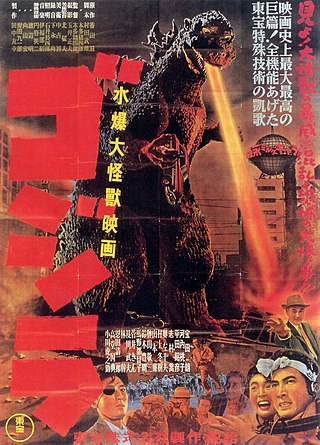Related Research Articles

Tokusatsu is a Japanese term for live-action films or television programs that make heavy use of practical special effects. Credited to special effects director Eiji Tsuburaya, tokusatsu mainly refers to science fiction, war, fantasy, or horror media featuring such technology but is also occasionally dubbed a genre itself. Its contemporary use originated in the Japanese mass media around 1958 to explain special effects in an easy-to-understand manner and was popularized during the "first monster boom" (1966-1968). Prior to the monster boom, it was known in Japan as Tokushu gijutsu or shortened Tokugi.

Hiromi Tsuru was a Japanese actress and narrator. During her life, she was attached to the Himawari Theatre Group as a child and then to Aoni Production at the time of her death. She was most known for voicing the character of Bulma for over 31 years. She was also known for her roles as Ukyo Kuonji, Dokin-chan, Madoka Ayukawa, Miyuki Kashima (Miyuki), Reiko Mikami, Meryl Strife (Trigun), Naomi Hunter, Oyone-baasan, and Asuna Kujo.
Japanese television drama, also called dorama (ドラマ) or J-drama, are television programs that are a staple of Japanese television and are broadcast daily. All major TV networks in Japan produce a variety of drama series including romance, comedy, detective stories, horror, jidaigeki, thriller, and many others. Single episode, or "tanpatsu" dramas that are usually two hours in length are also broadcast. For special occasions, there may be a one or two-episode drama with a specific theme, such as one produced in 2015 for the 70-year anniversary of the end of World War II.

Toei Company, Ltd. is a Japanese entertainment company. Headquartered in Ginza, Chūō, Tokyo, it is involved in film and television production, distribution, video game development, publishing, and ownership of 34 movie theaters. Toei also owns and operates studios in Tokyo and Kyoto and holds shares in several television companies. The company is renowned for its production of anime and live-action dramas known as tokusatsu, which incorporate special visual effects. It is also known for producing period dramas. Toei is the majority shareholder of Toei Animation and is recognized for its franchises such as Kamen Rider and Super Sentai.

Hiatari Ryōkō! is a high-school romance manga by Mitsuru Adachi. It was published by Shogakukan in 1979–1981 in the magazine Shōjo Comic and collected in five tankōbon volumes. It was later adapted into a live-action television drama series, an anime television series, and an anime film sequel to the television series. The title translates roughly as What a Sunny Day!

Shunsuke Kikuchi was a Japanese composer who was active from the early 1960s until 2017. He specialized in incidental music for media such as television and film. Kikuchi was regarded as one of Japan's most highly demanded film and TV composers, working principally on tokusatsu and anime productions, and also popular action films, jidaigeki, and television dramas.
Events in 1976 in Japanese television.
Hiroaki Murakami is a Japanese actor. He specializes in jidaigeki roles, and has also taken parts in tokusatsu and modern productions.
Gorō Mutsumi was a Japanese actor with more than 30 films to his credit. He has also appeared in numerous television shows, especially jidaigeki, in which he specializes in villains, and in tokusatsu. In addition, he is a stage and voice actor with prominent roles in narration, dubbing, and anime.

Teiji Ōmiya was a Japanese actor, voice actor, and a member of the Tokyo Actor's Consumer's Cooperative Society when he died. He attended Nihon University, but withdrew before completing his degree. He was known for playing the roles of kind old men in many 1970s anime series. During his life, he achieved 3-dan in kendo.
Kiyotaka Mitsugi is a Japanese actor and singer. His career has centered on television, in the genres of tokusatsu and jidaigeki.
Events in 1972 in Japanese television.
Events in 1980 in Japanese television.
Events in 1984 in Japanese television.
Events in 1986 in Japanese television.
Events in 1979 in Japanese television.
Events in 2007 in Japanese television.
Events in 2014 in Japanese television.
Masashi Ishibashi, was a Japanese actor and martial artist. Ishibashi had an extensive career in Japanese television, where was famous as portraying villains in historical dramas, in roles such as bad lieutenants, shifty merchants, yakuza, bandits, and corrupt priests.
References
- ↑ 逆転イッパツマン. Tatsunoko Productions (in Japanese). Archived from the original on February 7, 2009. Retrieved 2010-03-18.
- ↑ 陽あたり良好! (in Japanese). AllCinema Online. Retrieved 2010-03-17.